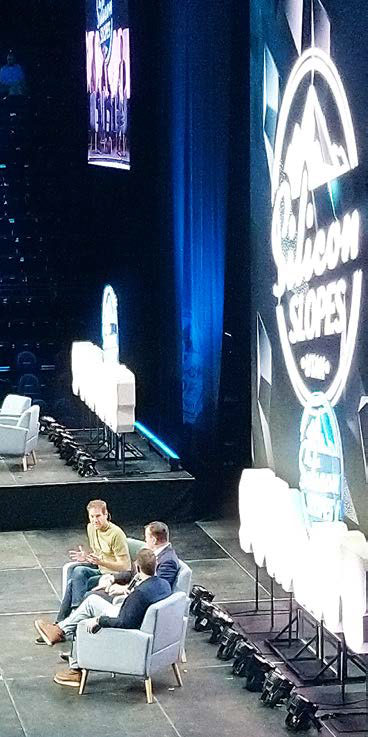Brice Wallace
The annual Silicon Slopes Summit, only six years old, will return next year as a bigger, broader event, its leader said at the most recent tech and business gathering.
Clint Betts, president and CEO of Silicon Slopes, told a crowd of thousands at Vivint Arena in Salt Lake City that the summit will expand into a weeklong series of activities taking place throughout Utah.{mprestriction ids="1,3"}
“Every part of Utah is part of Silicon Slopes,” Betts said. “If we say we’re going to be open and accessible to all, let’s freakin’ mean it. And let’s go across this entire state and bring this summit and this energy and this community to every part of Utah.”
The summit has traditionally been a two-day event in Salt Lake City, first at the Salt Palace Convention Center and this year at Vivint Arena. The first summit, in 2017, had more than 5,000 attendees and the next year the attendance figure topped 14,000. This year’s summit likely attracted about 8,000 people.
Next year, it will continue to have two days of activities in Salt Lake City, but Sept. 25-29 will see activities “from Logan to St. George,” Betts said, without giving many details about those activities.
“We’ll celebrate Utahns building startups and companies across the state,” he said, “and we’ll make sure the world knows what makes Utah such a hotbed of entrepreneurship and innovation.”
Betts noted that the summit started as part of Silicon Slopes’ mission to “put Utah’s tech community on the map.” The event aimed to attract talent, capital and attention to what Utahns were doing.
“Can you believe what we’ve built together here? Give yourself a round of applause because it really is quite something,” he told the crowd.
Betts promised that the summit would never move to Las Vegas, Austin or anyplace else. “It will always be in the state of Utah — always,” he said, adding that “no single person, company, VC firm or bank owns this thing.”
Looking to the future, Betts said he wants Silicon Slopes and the summit to continue for more than a hundred years, changing and improving as new generations and new leaders “take it to even greater heights.”
However, Betts cautioned that clamoring for the spotlight could derail the work needed to address Utah’s problems, including high housing prices, water scarcity, traffic congestion and poor air quality, which he said have resulted from Utah’s economic success.
“As an ecosystem matures and experiences success, the desire to be its leader or receive credit or monopolize the microphone increases exponentially,” Betts said.
And while there is nothing inherently wrong with that desire, a cohesive, productive community passes the microphone to anyone who wants to grab it, he said.
“It should not be owned by one person, organization or group. There’s no such thing as competition in community-building,” Betts said.
“The one thing that will trip us up faster than anything else — and force us to solve straight-up problems rather than success problems — is tearing each other down in a pointless battle for the spotlight. We got where we are by building each other up, celebrating our successes and giving back to the next generation. That’s what makes this community unique. And, everyone, let’s not stop now. If we do, we’ll lose the heart and soul of this community.”
Not everyone in the tech community needs to agree or be entirely aligned on issues, he said.
“But I hope we can be intentional about our desire to work together productively and go about this important endeavor, this important endeavor which is the future of this state, and I hope we do that for the love of Utah,” he said.
“You’re not doing this for the microphone or the spotlight,” he added. “Leave the politics to the politicians. We’ve got a community to serve.”{/mprestriction}








